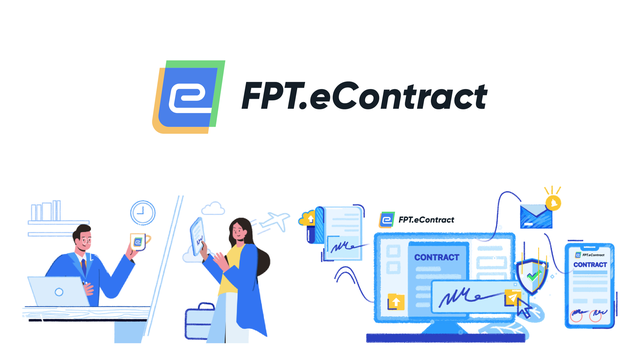Secure electronic contracts: The importance of timestamps
In today’s digital era, electronic contracts have gained popularity for their convenience and speed. However, the security of these contracts hinge on several factors, with timestamps playing a pivotal role in ensuring transparency and legality. A survey by the Vietnam Institute of Research and Development for Technologies – VIRD found that 85% of businesses using electronic contracts view timestamps as indispensable for avoiding disputes and ensuring legal validity.
What is a timestamp in an electronic contract?
A timestamp is a tool that verifies when a particular event or action, like the signing of an electronic contract, took place. It is created to guarantee that the contract data existed at a specific time and remains unchanged since then. The timestamp plays a crucial role in preventing fraudulent alterations of signing date, such as backdating, and help protect the integrity of electronic contracts.
If a contract must be signed before a legal deadline, the timestamp serves as proof that the signing occurred before such time. Without a timestamp, involved parties can easily alter the signing time, leading to complicated legal disputes. A 2023 report by the Ministry of Industry and Trade revealed that approximately 25% of electronic contract disputes arose from the inability to clearly verify the signing time. This highlights how contracts without timestamps are vulnerable to manipulation in terms of time, creating loopholes for fraudulent acts like backdating to evade legal responsibility.
The importance of timestamps in electronic contracts
Timestamps provide undeniable proof of contract signing time, offering several significant legal advantages:
- Verifying the exact signing time: Timestamps confirm the precise moment the contract was signed, establishing a strong legal foundation for involved parties in the event of disputes. For example, when a transaction occurs via FPT.eContract, the timestamp provided by a Time Stamping Authority (TSA) assures involved parties of the signing time’s authenticity.
- Protecting document integrity: Timestamps, when combined with digital signatures, ensure that the document has not been altered since the signing. This is especially crucial for legally binding contracts, where any changes can affect the parties’ rights.
- Preventing time fraud: One of the biggest risks with electronic contracts is the falsification of signing time. Timestamps provided by a TSA, an organization that offers timestamping services, ensure that time fraud cannot occur.
Risks of missing timestamps
The absence of timestamps in electronic contracts can lead to significant legal risks. Without verifiable timestamps, the exact signing time becomes unclear, opening the door for fraud or disputes over contract duration. Involved parties may exploit this ambiguity by backdating or altering the signing time after the contract is signed, resulting in unfair outcomes and potential risks for all of them.
When a business needs to demonstrate that a contract was signed before an important legal deadline, the lack of a timestamp makes it difficult to prove the transaction’s validity. Third parties, such as legal authorities or business partners, may refuse to recognize the contract, negatively affecting the transaction.
FPT.eContract: A solution with secure and legal timestamps
The FPT.eContract solution developed by FPT IS integrates an officially licensed timestamping service that adheres to strict legal and security standards for electronic contracts. The FPT.eContract’s timestamping system accurately records the signing time, ensuring that it cannot be altered or modified after the signing.
Statistics from FPT IS showed that over 5,000 businesses in Vietnam use FPT.eContract to sign more than 4 million electronic contracts annually. In these transactions, timestamps are critical in maintaining the contract integrity. The system complies fully with legal requirements for electronic contracts, and has helped businesses reduce 40% of dispute resolution time involving signing time verification.
FPT.eContract also uses cutting-edge technology to integrate timestamps throughout the entire contract lifecycle, from signing to fulfillment of terms. This enables businesses to monitor contract progress easily and creates a transparent database to manage important transactions.
Application of timestamps in electronic contracts
A survey conducted by the Vietnam Chamber of Commerce and Industry (VCCI) found that about 35% of commercial contracts require verification for each performance term throughout the transaction. Timestamps serve as an effective tool for this purpose. With FPT.eContract, timestamps are automatically provided at each phase of the contract, allowing businesses and their partners to track both overall and specific contract performance.
Incorporating timestamps in electronic contracts not only ensures legal compliance but also enhances business efficiency. The Digital Enterprise 2023 Report revealed that using electronic contracts with timestamps has helped Vietnamese businesses reduce administrative costs associated with contract signing and management by an average of 20%.
Furthermore, companies that implement FPT.eContract significantly reduce legal and financial risks. The International Organization for Standardization (ISO) reported that the use of timestamps in electronic contracts can lower the risk of disputes related to the contract time and performance by 15-20%.
Timestamps are essential in ensuring the security and legality of electronic contracts. By accurately capturing the time of signing, they prevent fraud, promote transparency, and strengthen the legal validity of transactions. FPT IS’s FPT.eContract solution, with its advanced integration of timestamping services, supports millions of transactions annually, helping businesses boost operational efficiency and reduce the risk of disputes.
| Exclusive Article by FPT IS Technology Expert
Đào Quỳnh Thu Project Manager for Electronic Signing Solution Development, FPT IS Co., Ltd |














